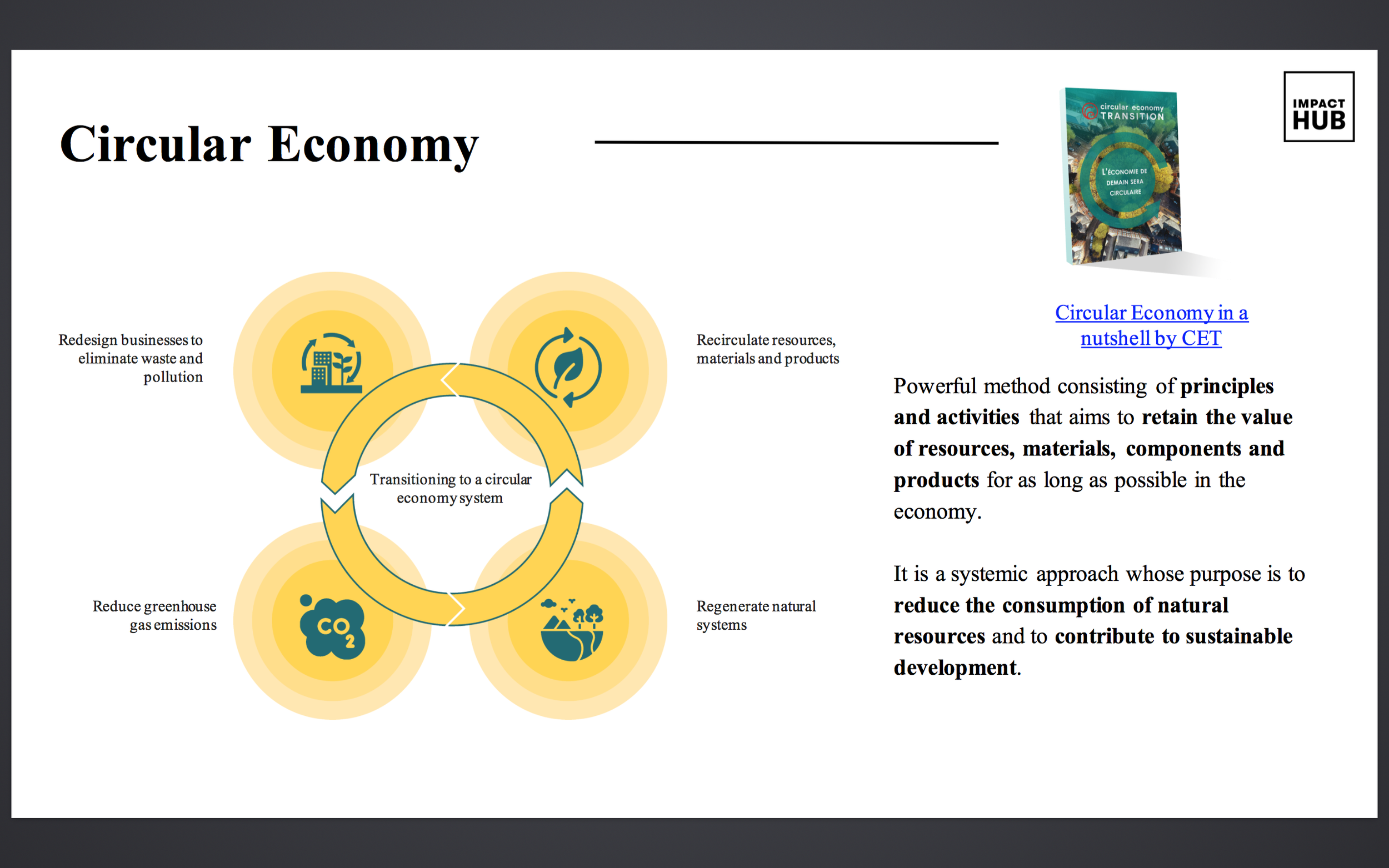By Cissy Sun, Head of Art-Science
In the 34th edition of the Café des Sciences Lecture series, we were pleased to partner with Impact Hub and invited experts from Switzerland and China to explore the innovative approaches towards Circular Economy and Sustainable Consumption.
In the first part of the lecture, representatives from Impact Hub, Ling-Yi (Carol) Chou, Partner of Sustainable Consumption at Impact Hub Shanghai, Jaïra Guevara, Programme Lead of Circular Economy Incubator at Impact Hub Geneva, and Taleb Bruno, Community Catalyst at Impact Hub Lausanne, shared with us their insights on circular economy and how the hubs in various locations empower the startups in social innovation.
Circular Economy & Impact Hub
Impact Hub is an innovation lab that brings engaged people together to enable the transition into a more inclusive and respectful future. It is the world’s largest network of entrepreneurial communities for impact, with over 100 locations across the world. In 2017, Impact Hub Shanghai was set up and started to support entrepreneurs with incubation programs and community events.
With a common goal and shared value, the Impact Hub Lausanne and Geneva also have a particular focus on Circular Economy. Their vision is to Shift Switzerland into an innovation leader in Circular Economy, considerably reducing the consumption of natural resources and contributing to sustainable development.
Upon sharing the limits of the model of Linear Economy, the concept of Circular Economy was introduced to the audience that it is a systemic approach whose purpose is to reduce the consumption of natural resources and to contribute to sustainable development. It is further explained through key principles, business models, activities, and mindset, and it is emphasized that the circular economy cannot be done by one individual, but it is a collective effort where we need innovative ideas to move forward.
Following the introduction of Impact Hubs, startup founders Aileen Wei, Founder of Safone and Zero Waste Beauty, and Nicolas Weber, Co-Founder & CEO of Voltiris, presented their entrepreneurial stories and practices towards a more sustainable future.
Safone - Sustainable Personal Care
It is reported that more than 120 billion packaging units are produced every year by the global cosmetics industry, much of which are not recyclable. While water appears plentiful, it is suggested that of the available 3% percent of fresh water on Earth, only 0.4% is available for use. If significant changes in water consumption are not made, two-thirds of the world may be facing water stress by the year 2025. The environmental issues lead to the creation of Safone, solid personal care products with natural ingredients but without water or plastic packages.
Besides the product, the company also exercises the concept of “zero-waste” in its marketing practices. They do not generate any waste in any of their community event as well as pop-up exhibitions. Through this, they try to deliver the idea of a sustainable lifestyle to their customers.
Voltiris – Enabling greenhouses’ energy transition
Sustainability is the key to the development of agriculture and the food system. After studying the problems of the current greenhouses, the co-founders of Voltiris came up with their innovative solutions: color-optimized solar modules compatible with crops.
Voltiris modules offer spectral filtering specific to crop production, combined with photovoltaic performance. Crops receive the light wavelengths they require to grow (i.e., red and blue), while the rest (i.e., green and NIR) is filtered and concentrated for electricity generation. Modules can be adapted to the specificities of any crop type: tomatoes, cucumbers, flowers, fruits, etc.
The device and method for sunlight-based power generation improve PV efficiency by 50%, and the method for solar tracking protects the sun-tracking system optimized for under-roof use, resulting in a light and cost-effective structure, which saves energy cost.
The technology could not only be used in glass greenhouses but also apply to plastic greenhouses, open crops, fish farms, and other scenarios. As a young startup, they are also looking for support and collaboration in terms of financing, pilot projects, and technological development.
During the Q&A session, the audience was very engaged with questions and comments. However, due to time constraints, we could only take a few questions for the speakers to answer. We encourage our audience to email us at artscience.china@swissnex.org with any additional questions. And we hope we could meet in our physical space soon for our future events.
Watch the recording of the webinar here!









